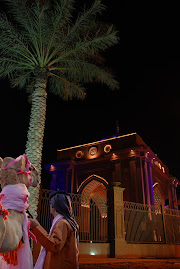Of course, there is also the inexcusable excuse that there is "no culture" in the UAE. Yes, it will definitely be hard to find it if you're busy hoarding the malls every weekend.
Here's the the link to Mar's column.
A little more curiosity about the local culture would go a long way | The National | Dec 24, 2008
By Simon Mars
I have an Emirati friend who only started to wear an abaya after the September 11 attacks. Before then, she says, she frequently dressed in jeans and a T-shirt: something that occasionally provoked her parents into chastising her for wearing western dress and neglecting her traditional garb. But she didn’t care. She liked dressing the way she did; it was, she tells me, a statement of her own identity, and if it happened to sync with what young western women were wearing, so what?
Seven years later I never catch her without a hijab on. She wears it, she says, as a sign of solidarity, of belonging to a culture that she feels that has been demonised, at least in part, by the West since the attacks.
But her decision, she says, is also a response to the fact that she, along with many of her friends and relatives both male and female, feel increasingly isolated in their own country. It’s not just the physical landscape that has changed so rapidly around them. To understand what I am talking about you only have to visit some of the country’s shopping malls and see their pitiable signs asking Westerners to try and keep enough clothes on so as not to offend.
She and her friends feel more comfortable in local clothes. To them it’s sign that they still stand out in a country that many of them feel is being lost to them, in a population dwarfed by a huge influx of expatriates to whom life in the UAE has, for the most part, offered something better than what they left at home.
For the local population, the cultural imbalance is unsettling to say the least. It’s a situation, some of them believe, that will only get worse. To hear how widespread this fear has become, just listen to some of the local radio call-in shows – that is if you can speak Arabic – something else that’s keeping the cultures apart. Most Emiratis, at least among the younger population, speak English. But how many of us, including rather shamefully myself, can engage with them fully in their own tongue?
Among some Emiratis, I’m told, there is a certain satisfaction about the impact that the current economic slowdown is having on the expat population. A few of us returning to where we came from would not, for them, be a particular cause for concern. That said, that’s not a widespread view, and among most young Emiratis there’s a acknowledgement of the contribution expatriates have made in building what is the world’s most ambitious rising nation.
Standing on the beach at the Atlantis Hotel in what had been, until recently, the middle of the ocean, I looked back towards a skyline that had not been there the last time this particular friend of mine had visited, only seven years ago. It’s a fantastic achievement. Back then the first signs of something stirring in Dubai had been when the Burj al Arab had opened. The Emirates Towers were in their final stages of completion and that strip of the Sheikh Zayed Highway near the World Trade Centre roundabout had begun to be filled in – but the notion of the current development of Abu Dhabi’s islands or the possibility that in less than a decade one of them would be home to a formula one race would have brought nothing but incredulous laughter.
So it’s not surprising that such a transformation has produced a sense of cultural or social dizziness, a feeling of bewilderment, or even isolation among the local population. I believe that the time has come, especially now since we face an uncertain economic future, for the expat population to take steps to engage more with the local culture and perhaps, more importantly, with the local population.
But where do you start? The wonderful Freej cartoons are a good place. The cartoons are funny and well made but they also tell you certain truths about the society and traditions where we’re living. A trip to the museums is not a bad idea either. Get out in to the countryside if you can – spend Friday morning in a village such as Hatta and mingle with the local population as they leave Friday prayers.
Another way is to read a copy of Mohammed al Fahim’s Rags to Riches. The story sheds brilliant insight into the way Abu Dhabi was just a little while ago when the locals would still make the camel treck from the coast to the interior of Al Ain to escape the heat and humidity of the summer.
What you read will surprise and educate you. The book shares great insight into the local culture and what living through the first stage of Abu Dhabi’s modern development was really like. And also, if you happen to be British, the story includes a salutary assessment of our country’s behaviour here. In fact, if I had my way, a copy would be given to every expat arriving in the country with a test, a month later, to see what they had learned.
As we go forward it’s vital that locals and expats learn more about each other. It’s true that many locals feel they’ve learnt enough – and not all positive — about us, so perhaps the onus should be more on the other side of the equation. A greater curiosity on our part towards the country we’re living in would not be that bad a resolution for the New Year.


No comments:
Post a Comment